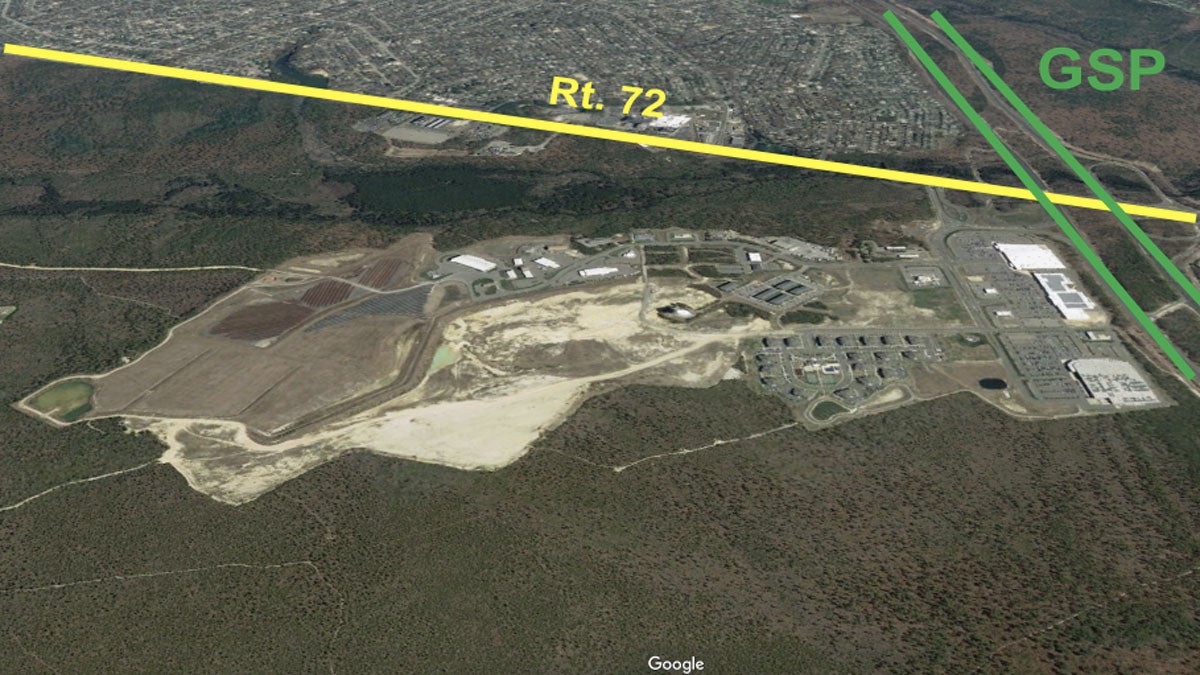Appellate Court upholds plan for solar farm in Ocean County

This is the site of of Stafford's former landfills and on the right is big box stores. (Google Earth)
A state appeals court yesterday upheld a decision to build a solar farm on top of a capped landfill in the Pinelands National Reserve, even though the site had been permanently set aside as undeveloped open space.
Rejecting an appeal by three environmental organizations, the court found the state Department of Environmental Protection and State House Commission acted properly in allowing deed-restricted land to be conveyed for the project.
The decision, the latest twist for a project that was first proposed 11 years ago, pitted two well-regarded state policies against each other — protecting land preserved as open space and converting old garbage dumps into viable use by converting them to solar farms.
The case revolved around Stafford Township’s efforts to convert two former landfills to a mixed-use project encompassing retail stores, residential, and government buildings on 370 acres in a Regional Growth area of the Pinelands.
To gain its approval for the plan, the Pinelands Commission required a conservation restriction against development on about 55 acres of one of the landfills and the proper closing of the site by the developer, the Walters Group.
The project won all the necessary approvals, including from the DEP and the State House Commission in 2010. The project called for more than 1,026 panels to be installed on the landfill capable of producing 6.5 megawatts of electricity, enough to power about 70 percent of the business park.
At the time, the DEP concluded the project would provide a variety of public needs and benefits; it would not cause irreparable harm to threatened and endangered species habitat; and there were no feasible alternatives.
The decision was appealed by the environmental groups — the Pinelands Preservation Alliance, New Jersey Conservation Foundation, and New Jersey Environmental Lobby. The court remanded the issue to the DEP when it found they had failed to consult their own staff from the endangered and nongame species program.
At that point, the department found a provision allowing the township to obtain lease proceeds was inconsistent with state law, and had the parties amend the agreement to require replacement land instead of lease payments. The township set aside 40 acres of woodland next to a wildlife refuge to comply with the agency’s determination.
When the DEP and the State House Commission approved the amended plan, the environmental groups went back to court, arguing more replacement land should be set aside to allow building on the deed-restricted property.
The court found the agency acted properly. “We are satisfied that the DEP amply considered the public interest in granting the partial release of the conservation restriction,” it ruled.
In addition, the court dismissed the appellants’ claim that the decision violated the Pinelands Comprehensive Management Plan, saying the agreement complied with the law and was not arbitrary, capricious, or unreasonable.
____________________________________________
NJ Spotlight, an independent online news service on issues critical to New Jersey, makes its in-depth reporting available to NewsWorks.
WHYY is your source for fact-based, in-depth journalism and information. As a nonprofit organization, we rely on financial support from readers like you. Please give today.




